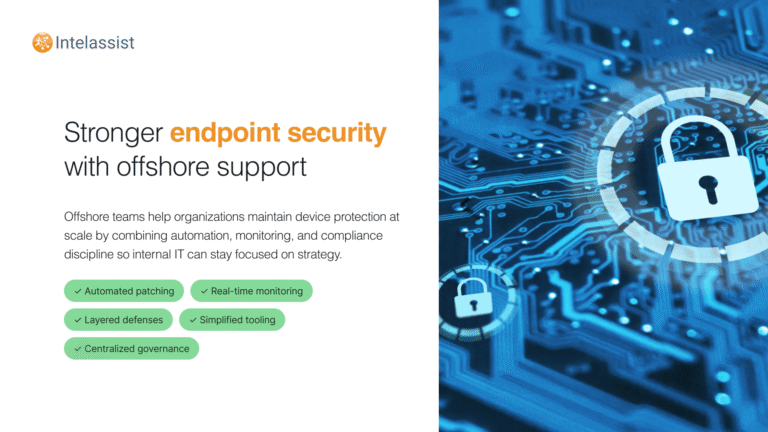Case Study
How Offshore Support Can Strengthen Endpoint Security
Securing hundreds or thousands of devices across a distributed workforce has become a board-level priority. Cyberattacks are rising, compliance standards are tightening, and the cost of a breach now averages nearly $4.9 million globally, according to IBM’s 2024 Cost of a Data Breach Report. Yet internal IT teams often spend more time reacting to patching schedules and compliance checks than leading innovation.
This is where offshore support changes the equation. By embedding remote teams into governance frameworks, organizations can maintain consistent endpoint security while freeing their leaders to focus on strategic priorities.

1. Closing security gaps through consistent patching
Unpatched devices remain one of the most common sources of breaches, the U.S. Cybersecurity and Infrastructure Security Agency (CISA) warns. But keeping every endpoint updated is a resource drain if handled manually. Offshore teams can manage patching workflows within established client systems, ensuring consistency and timeliness across entire device fleets.
For executives, this translates into lower risk exposure and fewer vulnerable entry points without overextending in-house resources.
2. Continuous monitoring that scales globally
Endpoint protection is not a quarterly project; it requires constant vigilance. Offshore support provides around-the-clock monitoring that flags anomalies, tracks compliance, and ensures antivirus and encryption remain active.
The result is not just alerts, but the confidence that device standards are being enforced globally, whether a user is in Manila, New York, or London. Leadership gains visibility without needing to expand internal headcount.
3. Strengthen defenses through cyber-mature practices
Cybersecurity maturity is increasingly shaping business outcomes. Deloitte’s Global Future of Cyber survey (2024) found that high-maturity organizations are 27% more likely to achieve their business goals compared to their peers. These firms report closer alignment between CISOs and boards, stronger adoption of AI-enabled cyber tools, and greater investment in resilience planning.
For endpoint security, this means layering defenses beyond antivirus—such as encryption, behavioral analytics, and AI-assisted monitoring—while ensuring leadership visibility. Offshore support teams can help implement these practices at scale by managing endpoint policies, monitoring compliance, and producing actionable reporting. By embedding these functions within your governance model, offshore professionals extend the discipline of cyber-mature organizations to the endpoint level, ensuring that resilience is not fragmented across geographies.
4. Simplifying oversight by reducing operational complexity
Many enterprises now juggle dozens of security tools. A 2025 ITPro global survey found nearly half of enterprises manage more than 20 cybersecurity platforms, creating blind spots and inefficiencies. Offshore teams streamline execution by centralizing tasks within existing systems, cutting through tool sprawl and enforcing policies consistently.
This simplicity matters at the leadership level: reduced complexity lowers hidden costs, prevents fragmentation, and improves governance.
5. Audit readiness as a built-in function
Endpoint security is not only about defense. It is also about demonstrating compliance and resilience when auditors, regulators, or clients demand proof. Offshore teams generate audit-ready records as part of daily operations, ensuring traceability and accountability.
Offshore support teams that integrate into client governance frameworks deliver the same level of rigor, offering executives peace of mind that oversight and compliance can withstand scrutiny.
Final perspective for executive leaders
Endpoint security is no longer a back-office concern. It is directly tied to financial risk, operational continuity, and brand reputation. Offshore support provides the structure to scale endpoint governance globally without compromising standards or overextending in-house staff.
For senior leaders, this means fewer vulnerabilities, predictable compliance, and the ability to keep internal IT leadership focused on strategy, not routine administration
about Intelassist
Intelassist provides offshore IT professionals who integrate directly into client systems and governance models. Our teams are trained in endpoint management, compliance reporting, and incident monitoring, operating under your security protocols and oversight.
For executive teams, this model delivers resilience, visibility, and confidence, ensuring that security standards remain uncompromised, even as global device fleets continue to grow.
contact US
How can we help?
Get in touch with one of our local experts today. We typically respond within 24 hours.


